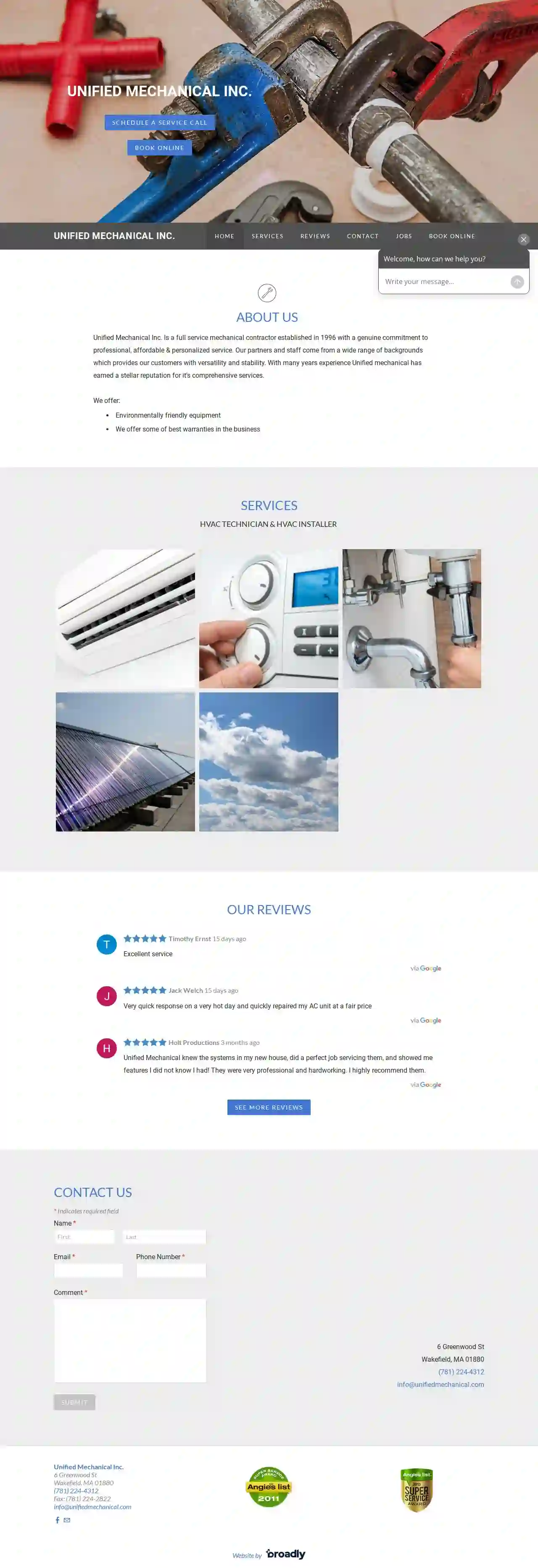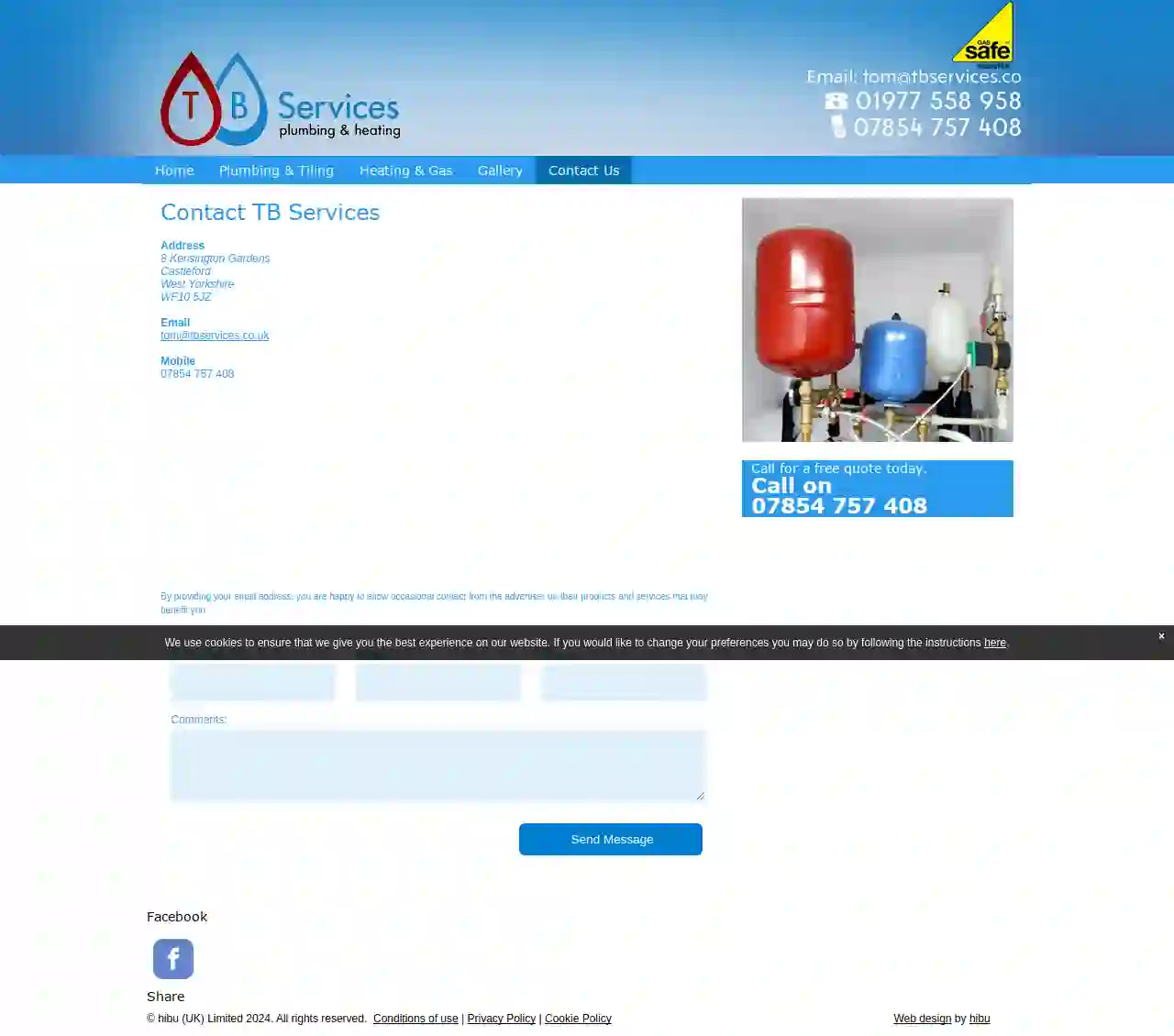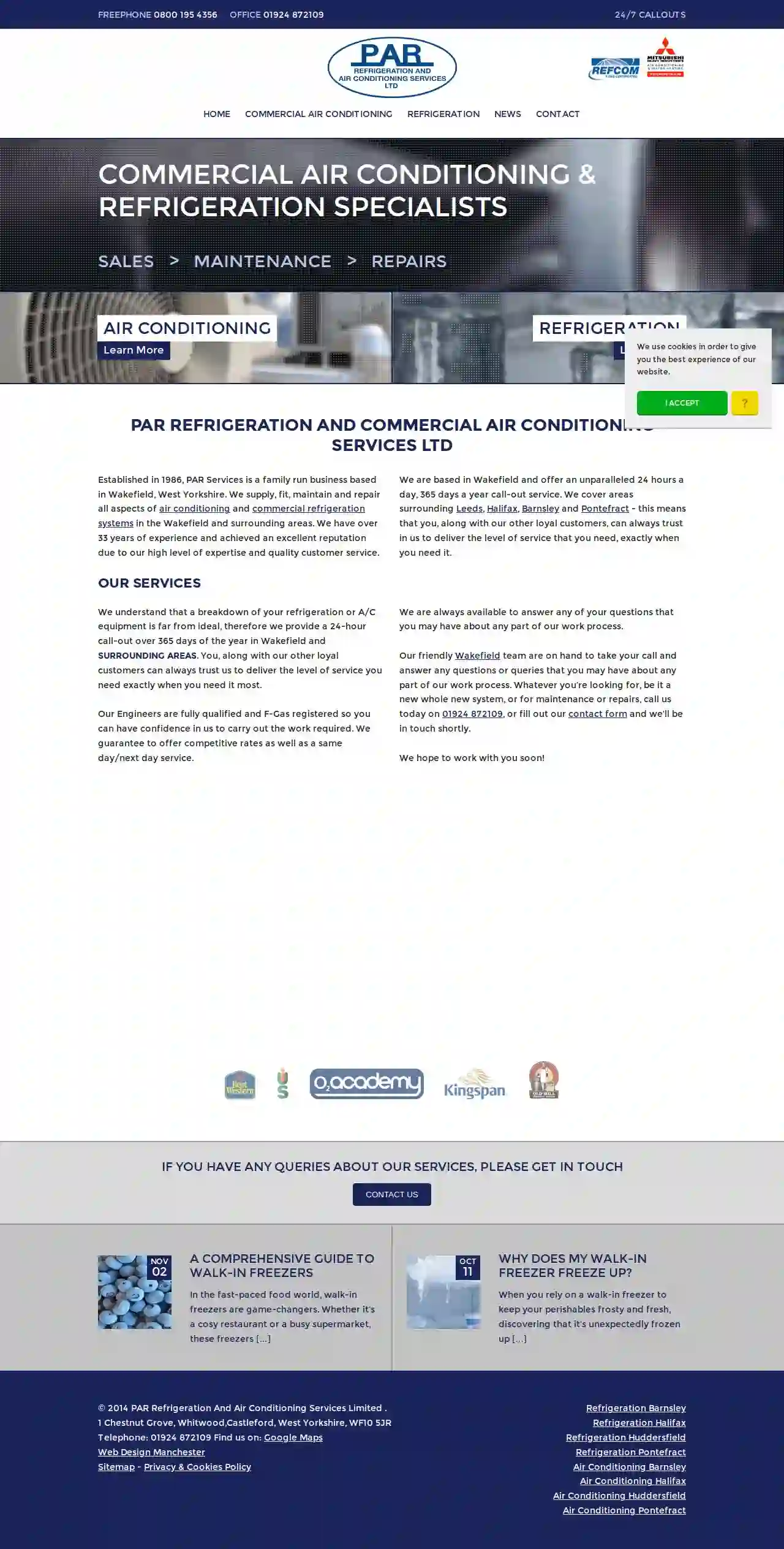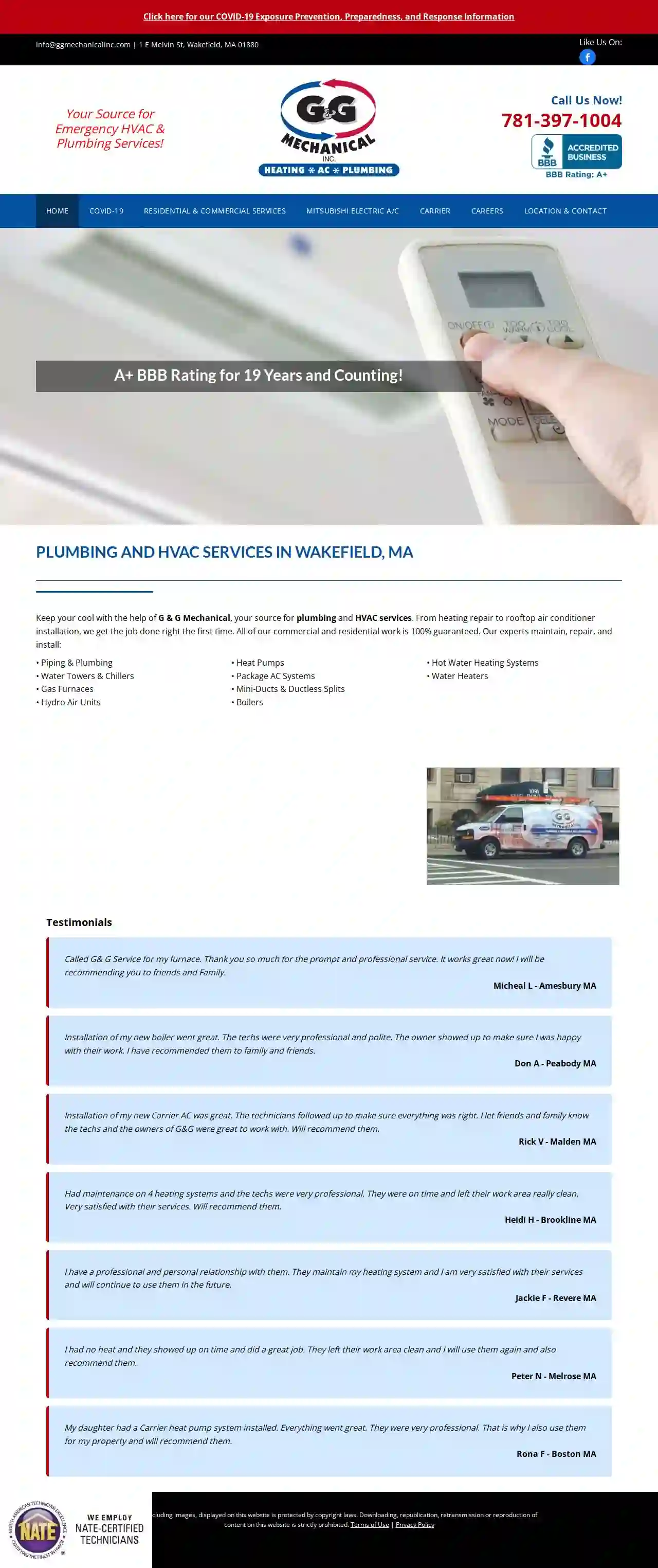HVAC Companies Featherstone
Find the best HVAC Companies in Featherstone
Get multiple AC and Heating Services quotes for your project today! Compare profiles, reviews, accreditations, portfolio, etc... and choose the best service.

S T Plumbing & Heating Gas Specialists Ltd
4.425 reviews11 Hill Top, Knottingley, WF11 8EB, GBST Plumbing & Heating is a family-run business with over 45 years of experience serving North, West, South Yorkshire and the Humberside areas. We pride ourselves on our friendly and professional team, dedicated to meeting all your plumbing and heating needs. We've been recognised for our excellence, achieving numerous awards including UK Plumber of the Year Finalist 2019, National Construction award winner: Plumber of the Year 2022, Northern Enterprise award winner 2022: Best Family run Plumbing & Heating Firm – Yorkshire, Construction Engineer Awards 2023: Most Trusted Boiler Installation Service – West Yorkshire, 2023 On The Tools, Plumber of the Year, SME Northern Enterprise Awards 2023: Family Run – Plumbing & Heating Business of the year – Yorkshire and HPM Awards 2024: Best Use of a Boiler System. We offer a comprehensive range of services, including boiler installation, repair, and servicing, gas safety testing and inspections, underfloor heating, electrical installations, unvented cylinder installation and maintenance, plumbing services, bathroom installations, and LPG work. We also provide powerflushing services. As a TrustedTrader endorsed by Which?, you can be confident in our commitment to quality and reliability. Our team of fully qualified and apprentice-trained engineers are Gas Safe registered, ensuring all work meets the highest safety standards. We believe in transparent pricing, providing clear breakdowns of costs before any commitment. We also offer extended manufacturer warranties on boiler installations, giving you peace of mind. With over 45 years of experience, we're dedicated to providing tailored solutions and excellent customer support.
- Services
- Why Us?
- Accreditations
- Gallery
Get Quote
Unified Mechanical Inc.
593 reviews6 Greenwood St, Wakefield, 01880, GBUnified Mechanical Inc. Is a full service mechanical contractor established in 1996 with a genuine commitment to professional, affordable & personalized service. Our partners and staff come from a wide range of backgrounds which provides our customers with versatility and stability. With many years experience Unified mechanical has earned a stellar reputation for it's comprehensive services. We offer: Environmentally friendly equipment We offer some of the best warranties in the business
- Services
- Why Us?
- Gallery
Get Quote
T B Services
51 reviews8 Kensington Gardens, Castleford, WF10 5JZ, GBTB Services has an enviable reputation of providing Castleford and surrounding areas with first class plumbing and central heating services. Available seven days a week, our friendly, reliable and dedicated team are always on hand. If you require any further information, please don't hesitate to give us a call. We are a local, friendly business that covers Castleford and surrounding areas, available seven days a week, with very competitive prices, experienced, professional and reliable service, fully insured, free quotes, estimates and advice, and provide references upon request.
- Services
- Why Us?
- Gallery
Get Quote
J.H.M Heating Engineers
3.73 reviews10 Park Crest, Hemsworth, WF9 4TR, GBJ.H.M Heating is a leading Heating, Oil and Renewable's Engineers serving Hemsworth, Pontefract, Wakefield, Doncaster, Selby, York, Huddersfield, Halifax, Sheffield and Barnsley since 2000. We offer a wide range of services including Domestic and LPG Gas, Oil boilers, Solar thermal domestic hot water, Ground and air source heat pumps. As a fully-certified professional and Gas Safe registered, I'm ready to tackle anything from the most complex and large scale construction projects to the smallest of repair jobs. I'm fueled by my commitment to excellence and go the extra mile to make sure my clients are completely satisfied with my work. We hold full Liability Insurance upto £2,000,000.
- Services
- Why Us?
- Our Team
- Gallery
Get Quote
ProTecBoilers Pontefract
Pontefract, Tanshelf Drive, WF8 4DJ, GBProTecBoilers is a family business based in Lofthouse, providing professional heating services across Leeds, Wakefield, and surrounding areas. We pride ourselves on offering the best advice and ensuring any heating system is cost-effective and suitable for your home. Our team is City & Guilds qualified, fully insured, and all our work comes with a guarantee, giving you peace of mind knowing we're there when you need us. We offer a comprehensive range of services, including new boiler installations, full central heating system setups, boiler servicing, gas fire and cooker services, landlord certificates, and repairs for all boiler makes and models.
- Services
- Why Us?
- Accreditations
- Gallery
Get Quote
HiPro Heating Wakefield
547 reviews531 Denby Dale Road West, Wakefield, WF4 3ND, GBHiPro Heating & Plumbing is Wakefield's trusted Gas and Heating service, boasting a team of fully-qualified, Gas Safe-certified engineers. Specialising in a variety of heating appliances – from gas and LPG to electric and Renewable Heating Systems – We're proud to be among the elite Kingspan/Range service engineers in Yorkshire. We are committed to providing our customers with the highest quality service and the most comfortable homes possible. We go the extra mile to make sure that our work is done to the highest standards, and we are always available to answer your questions and concerns. Our expertise in boiler maintenance ensures your heating system is running efficiently and safely. We specialise in unvented (G3) cylinders, and we carry most parts for the Range Tribune XE and HE cylinders to allow rapid repair and servicing of these systems. We also work extensively on Range Flomax, Gledhill, and Megaflo systems. If you are looking for a reliable and experienced gas and heating engineer in Wakefield, then HiPro Heating Engineers is the perfect choice for you.
- Services
- Why Us?
- Accreditations
- Our Team
- Testimonials
- Gallery
Get Quote
PAR Refrigeration And Air Conditioning Services Limited
4.819 reviews1 Chestnut Grove, Castleford, WF10 5JR, GBEstablished in 1986, PAR Services is a family run business based in Wakefield, West Yorkshire. We supply, fit, maintain and repair all aspects of air conditioning and commercial refrigeration systems in the Wakefield and surrounding areas. We have over 33 years of experience and achieved an excellent reputation due to our high level of expertise and quality customer service. We are based in Wakefield and offer an unparalleled 24 hours a day, 365 days a year call-out service. We cover areas surrounding Leeds, Halifax, Barnsley and Pontefract - this means that you, along with our other loyal customers, can always trust in us to deliver the level of service that you need, exactly when you need it.
- Services
- Why Us?
- Our Team
- Gallery
Get Quote
G & G Mechanical
4.318 reviews1 E Melvin St, Wakefield, 01880, GBG & G Mechanical was launched in 2000 with a goal to provide the same level of care and dedication to each project as if it were our own. We are committed to our customers, our employees, and our community. We have built a loyal customer following by providing the highest level of customer service possible. Providing our clients with quality, on-time service is our top priority. Our fleet of trucks are computer dispatched and feature GPS tracking, allowing us to verify their location at all times so you know when to expect service. We are your source for emergency HVAC & Plumbing services! Keep your cool with the help of G & G Mechanical, your source for plumbing and HVAC services. From heating repair to rooftop air conditioner installation, we get the job done right the first time. All of our commercial and residential work is 100% guaranteed. Our experts maintain, repair, and install: Piping & Plumbing Water Towers & Chillers Gas Furnaces Hydro Air Units Heat Pumps Package AC Systems Mini-Ducts & Ductless Splits Boilers Hot Water Heating Systems Water Heaters We are proud to be an A+ BBB rated business for 19 years and counting!
- Services
- Why Us?
- Accreditations
- Testimonials
- Gallery
Get Quote- Wa
Wakefield HVAC
100 Main St, Suite 200, Wakefield, 01880, GBWakefield HVAC is your trusted partner for all your heating, ventilation, and air conditioning needs in Wakefield. We are a team of experienced and certified technicians dedicated to providing exceptional service and quality workmanship. With years of experience in the industry, we have built a reputation for reliability, efficiency, and customer satisfaction. Whether you need a new system installation, repair, or maintenance, Wakefield HVAC is here to keep your home or business comfortable year-round.
- Services
- Why Us?
- Gallery
Get Quote 
CS Autos
4.492 reviewsUnit 5B, Prince George Industrial Estate, Skinner Lane, Pontefract, WF8 1HX, GBCS Autos is a reputable and experienced garage based in Pontefract, offering a range of services including MOT testing, car servicing, air conditioning repairs, and injector cleaning. With over 25 years of experience, our team of skilled technicians use only genuine parts or like-for-like parts to ensure your vehicle is in top condition. We pride ourselves on our transparent pricing model, with no hidden charges, and our commitment to providing excellent customer service. Whether you need a routine service or a more complex repair, our team is here to help. Contact us today to book your appointment and experience the CS Autos difference.
- Services
- Why Us?
- Gallery
Get Quote
Over 12,692+ HVAC Companies registered
Our HVAC experts operate in Featherstone & beyond!
HVACCompaniesHub has curated and vetted Top HVAC Businesses arround Featherstone. Find the most trustworthy business today.
Frequently Asked Questions About HVAC Companies
- What is the source of the problem? Get a clear explanation of the issue and what caused it.
- What are my repair options? Discuss different repair solutions, if applicable, and their associated costs.
- Are there any preventative measures I can take? Find out if there are steps you can take to prevent future problems.
- Do you recommend a repair or replacement? If repairs are extensive or the system is old, consider replacement.
- What are the warranties on parts and labor? Understand the warranties before agreeing to any repairs.
- Do you have any customer reviews or testimonials I can check? Reputable HVAC technicians are often happy to provide references or direct you to customer reviews.
- AC Repair: [Price Range]
- Furnace Repair: [Price Range]
- AC Installation: [Price Range]
- Furnace Installation: [Price Range]
- Heat Pump Installation: [Price Range]
- HVAC Maintenance: [Price Range]
- Frequent Repairs: If your system requires repairs frequently, it may be more cost-effective to replace it.
- Age of System: HVAC systems typically last 15-20 years. If your system is nearing or beyond that age, it's likely less efficient and more prone to breakdowns.
- Increased Energy Bills: A significant rise in energy bills could indicate your system is losing efficiency and needs replacement.
- Uneven Temperatures: If some rooms are too hot or too cold, it could be a sign of an inefficient HVAC system.
- Poor Indoor Air Quality: If you're experiencing allergies, dust, or other indoor air quality issues, a new HVAC system with better filtration could help.
- Strange Noises or Smells: Unusual noises or foul odors emanating from your HVAC system could signal a problem that requires a system replacement.
What should I ask an HVAC technician during a service call?
How much do HVAC services cost?
What are the signs that I need a new HVAC system?
What is the difference between an AC unit and a heat pump?
What should I ask an HVAC technician during a service call?
- What is the source of the problem? Get a clear explanation of the issue and what caused it.
- What are my repair options? Discuss different repair solutions, if applicable, and their associated costs.
- Are there any preventative measures I can take? Find out if there are steps you can take to prevent future problems.
- Do you recommend a repair or replacement? If repairs are extensive or the system is old, consider replacement.
- What are the warranties on parts and labor? Understand the warranties before agreeing to any repairs.
- Do you have any customer reviews or testimonials I can check? Reputable HVAC technicians are often happy to provide references or direct you to customer reviews.
How much do HVAC services cost?
- AC Repair: [Price Range]
- Furnace Repair: [Price Range]
- AC Installation: [Price Range]
- Furnace Installation: [Price Range]
- Heat Pump Installation: [Price Range]
- HVAC Maintenance: [Price Range]
What are the signs that I need a new HVAC system?
- Frequent Repairs: If your system requires repairs often, it may be more cost-effective to replace it.
- Age of System: HVAC systems typically last 15-20 years. If your system is nearing or beyond that age, it's likely less efficient and more prone to breakdowns.
- Increased Energy Bills: A significant rise in energy bills could indicate your system is losing efficiency and needs replacement.
- Uneven Temperatures: If some rooms are too hot or too cold, it could be a sign of ductwork problems or an undersized/aging system.
- Poor Indoor Air Quality: If you're experiencing allergies, dust, or other indoor air quality issues, a new HVAC system with better filtration could help.
- Strange Noises or Smells: Unusual noises or foul odors emanating from your HVAC system could signal a problem that requires a system replacement.